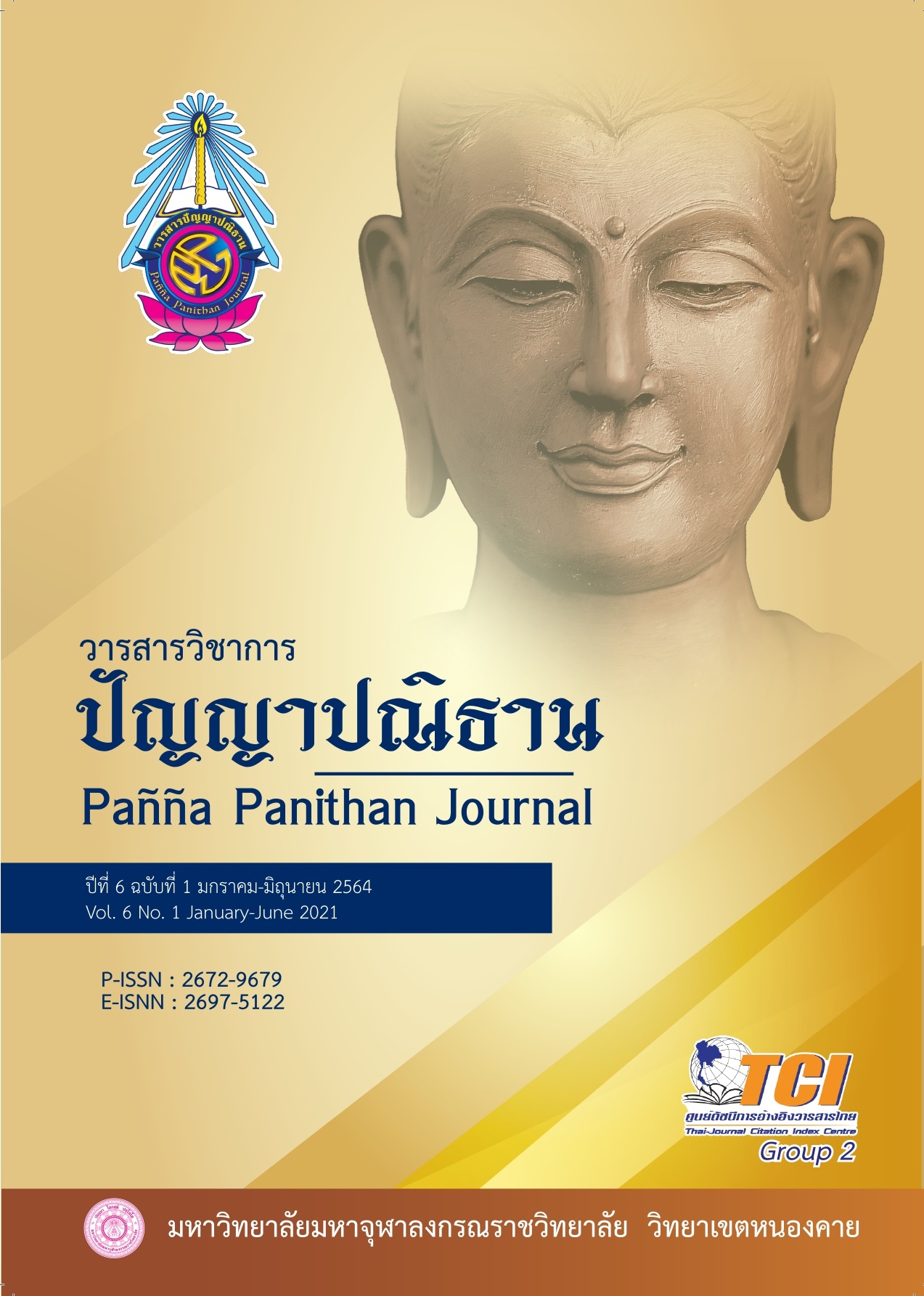THE ANALYTICAL STUDIES OF TRADITIONAL MEDICINE WISDOM’S CONCEPTS IN MEKONG BASINS
Main Article Content
Abstract
ABSTRACT
The objectives of this research article are to study the concept of traditional medicine wisdom and to study the analysis of the traditional medicine wisdom in Mekong basin. This research is a qualitative research, conducted by in-depth interviews with 16 population of the traditional medicine doctors, divided in 5 Thais and 11 Laos PDR.
The research found that 1) the concept of traditional medicine wisdom, it found that the traditional medicine doctors who treat ailments in the traditional wisdom which differs according to each locality, divided into 8 categories: Mor Ya Haak Mai (Root Doctor), Mor Pao (Blow Doctor), Mor Sen End or Mor Nuad (Tendon or Massage Doctor or), Mor Phra (Monkhood Doctor), Mor Ya Moh or Mor Sa Muan Pai (Pot or Herbal Doctor), Mor Kra Dook (Bone Doctor), Mor Tum Yae (Midwife Doctor), Mor Cheed Ya or Mor Theuan (Injection or Quack Doctor) 2) to study the analysis of the traditional medicine wisdom in Mekong basin, it found that medical treatment by local medicine doctors at the Mekong basin was one of the first treatment options for people because it was a place that people could access easily, economically and effectively, even though nowadays the wisdom of traditional medicine was sometimes compared to modern medicine. But the traditional doctors always were the first to treat the sufferings to the villagers. Besides, some traditional medicine doctors were also good examples of self-possession, such as keeping precepts, making merit, retaining mental purification. It could be seen that the wisdom of traditional medicine practitioners of both the Thai and Laos side was a science of health care for people who rely on beliefs, faith and local resources. Moreover, they treated with both body and mind healing in parallel. Such knowledge therefore deserved the government to have the data stored officially in order to maintain the concepts of traditional wisdom to live in Mekong basin forever
Article Details
References
เอกสารอ้างอิง
กรมแพทย์ชนบท. (2558). วิชั่นหมอยาไทย แต่ไร้การสนับสนุน. หนังสือพิมพ์ไทยรัฐ, วันจันทร์ที่ 12 ตุลาคม พ.ศ. 2558.
เกษม สุขสวัสิดิ์. (2547). ภูมิปัญญาชาวบ้านวิถีชีวิตเกษตรชุมชนพึ่งตนเอง : ศึกษาเฉพาะกรณีศูนยฺรวมสวนเห็ดบ้านอรัญญิก ตำบลกระทุ่มล้ม อำเภอสามพราน จังหวัดนครปฐม. ใน ปริญญา ศิลปศาสตรมหาบัณฑิต สาขาสังคมศาสตร์เพื่อการพัฒนาบัณฑิต. สถาบันราชภัฏธนบุรี.
จารุวรรณ ธรรมวัตร. (2543). โครงการตำราคณะมนุษยศาสตร์และสังคมศาสตร์ มหาวิทยาลัยสารคาม. อุบลราชธานี : หจก. ศิริธรรมออฟเซ็ท.
เดชขจร ภูทิพย์. (2546). การเมืองเรื่องทรัพยากรน้ำ : ศึกษาเฉพาะกรณีโครงการฝายราษีไศล. ใน วิทยานิพนธ์ศิลปศาสตรมหาบัณฑิต สาขารัฐศาสตร์. มหาวิทยาลัยรามคำแหง.
ธนิดา ผาติเสนะ. (2561). เปรียบเทียบกระบวนการรักษาโรคมะเร็งระหว่างหมอพื้นบ้านไทยและลาว. วารสารชุมชนวิจัย, (12)3, 79-90.
นิพัทธ์พร เพ็งแก้ว และสุภาภรณ์ ปิติพร. (2541). เดินป่าค้นหาภูมิปัญญา. วารสารสื่อพลัง วิทยาลัยการแพทย์แผนไทยอภัยภูเบศร, (6)3, 45-49.
บุญเลิศ สดสุชาติ. (2553). มานุษยวิทยาสุขภาพ. กรุงเทพมหานคร : โอ.เอส.พริ้นติ้ง เฮาส์.
ปิยนุช ยอดสมสวย และสุพิมพ์ วงษ์ทองแท้. (2552). โครงการวิจัยเรื่องการศึกษาภูมิปัญญาของหมอพื้นบ้านในอำเภอองครักษ์ จังหวัดนครนายก. กรุงเทพมหานคร : คณะสหเวชศาสตร์ มหาวิทยาลัยศรีนครินทรวิโรฒ.
พระสุริยา มาตย์คำ. (2552). การพัฒนากระบวนการสืบทอดภูมิปัญญาหมอพื้นบ้านในประเทศไทยและสาธารณรัฐประชาธิปไตยประชาชนลาว. ใน วิทยานิพนธ์ปริญญาปรัชญาดุษฎีบัณฑิต สาขายุทธศาสตร์การพัฒนาภูมิภาค. มหาวิทยาลัยราชภัฏเลย.
มูลนิธิโรงพยาบาลเจ้าพระยาอภัยภูเบศร์. (2554). โครงการอุ้มชูครูหมอยาพื้นบ้าน. ปราจีนบุรี : มูลนิธิโรงพยาบาลเจ้าพระยาอภัยภูเบศร์.
รุ่ง แก้วแดง. (2542). ปฏิวัติการศึกษาไทย. พิมพ์ครั้งที่ 6. กรุงเทพมหานคร : มติชน.
บุญมา (ไม่ทราบนามสกุล). (24 ตุลาคม 2558). แนวคิดหมอยาพื้นบ้านของ สปป.ลาว. (พระเดชขจร ขนฺติโธร, ผู้สัมภาษณ์).
สำนักงานวัฒนธรรมจังหวัดชลบุรี. (2544). วัฒนธรรม พัฒนาการทางประวัติศาสตร์ เอกลักษณ์ และภูมิปัญญา จังหวัดชลบุรี. กรุงเทพมหานคร : โรงพิมพ์คุรุสภา.


